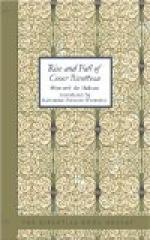“I’m nervous,” she said.
The rest of the evening was spent by the elders at the card-table, and by the young people in those little games called innocent because they cover the innocent by-play of bourgeois love. The Matifats joined in these games.
“Cesar,” said Constance as they drove home, “go and see Monsieur le Baron de Nucingen on the 8th so as to be sure of having your payments ready in advance of the 15th. If there should be any hitch, how could you scrape the money together if you have only one day to do it in?”
“I will see to it, wife,” said Cesar, pressing his wife’s hand and his daughter’s, adding, “Ah, my dear white lambs, I have given you a sad New Year’s gift!”
The two women, unable to see him in the obscurity of the hackney coach, felt his tears falling hot upon their hands.
“Be hopeful, dear friend,” said Constance.
“All will go well, papa; Monsieur Anselme Popinot told me he would shed his blood for you.”
“For me?” said Cesar, trying to speak gaily; “and for the family as well. Isn’t it so?”
Cesarine pressed her father’s hand, as if to let him know she was betrothed to Anselme.
IV
During the first three days of the year, two hundred visiting cards were sent to Birotteau. This rush of fictitious friendship, these empty testimonials of favor, are horrible to those who feel themselves drawn down into the vortex of misfortune. Birotteau presented himself three times at the hotel of the famous banker, the Baron de Nucingen, but in vain. The opening of the year with all its festivities sufficiently explained the absences of the financier. On the last occasion Birotteau got as far as the office of the banker, where the head-clerk, a German, told him that Monsieur de Nucingen had returned at five in the morning from a ball at the Kellers’, and would not be visible until half-past nine o’clock. Birotteau had the luck to interest this man in his affairs, and remained talking with him more than half an hour. In the course of the afternoon this prime minister of the house of Nucingen wrote Birotteau that the baron would receive him the next day, 13th, at noon. Though every hour brought its drop of absinthe, the day went by with frightful rapidity. Cesar took a hackney coach, but stopped it several paces distant from the hotel, whose courtyard was crowded with carriages. The poor man’s heart sank within him when he saw the splendors of that noted house.
“And yet he has failed twice,” he said to himself as he went up a superb staircase banked with flowers, and crossed the sumptuous rooms which helped to make Madame Delphine de Nucingen famous in the Chaussee d’Antin. The baronne’s ambition was to rival the great ladies of the Faubourg Saint-Germain, to whose houses she was not as yet admitted. The baron was breakfasting with his wife. In spite of the crowd which was waiting for him in the counting-room, he had left word that any friend of du Tillet was to be admitted. Birotteau trembled with hope as he noticed the change which the baron’s order had wrought in the hitherto insolent manner of the footman.




